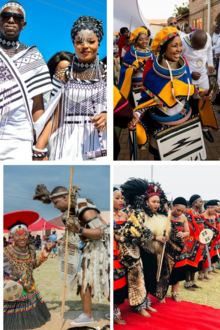
Back شعب نجونى (مجموعه عرقيه فى جنوب افريقيا) ARZ Нгуні (народы) Byelorussian Nguni German Ngunoj Esperanto Nguni Spanish Ngunit Finnish Nguni (peuple) French न्गूनी लोग Hindi Ngoni Italian Nguni Dutch
 Top left, Xhosa; Top right, Ndebele; Bottom left, Zulu; Bottom right, Swati | |
| Total population | |
|---|---|
| 31,618,000[citation needed] | |
| Languages | |
| Nguni languages IsiXhosa, IsiZulu, Siswati, Ndebele | |
| Religion | |
| Christianity and (uThixo or Qamata) Unkulunkulu | |
| Related ethnic groups | |
| Sotho-Tswana peoples, Tsonga people, Khoisan, San people and Ngoni people |
The Nguni people are a linguistic cultural group that migrated to South Africa, made up of Bantu ethnic groups from central Africa, with offshoots in neighboring countries in Southern Africa. Swazi (or Swati) people live in both South Africa and Eswatini, while Ndebele people live in both South Africa and Zimbabwe.
A group of the Nguni living in present-day Malawi and Zambia also migrated from central Africa during the Bantu expansion, they known as AbaNgoni or Ngoni.
The Xhosa, who were the first Bantu group to arrive during the Bantu expansion settled in the south and eastern part of south Africa and established federations (AbaThembu, AmaMpondo, AmaXhosa, and AmaMpondomise) in the region during the 14th century AD. The Xhosa trace their tribe name back to the Khoi , the earlier inhabitants of “South Africa” whom they encountered. The Khoi named the Nguni "Xhosa", meaning “fierce” (in battle) possibly due to their superior fighting ability. The traditional homeland of the Xhosa people stretches from the Gamtoos River up to Umzimkhulu near Natal.
The Xhosas were originally known as the Aba-Nguni until renamed by the Khoi. The Xhosa often called the "Red Blanket People," are speakers of Bantu languages living in south-east South Africa and in the last two centuries throughout the southern and central-southern parts of the country.
Both the Ndebele of Zimbabwe and the Ngoni migrated northward out of South Africa in the early 19th century, during a politically tumultuous era that included the Mfecane and Great Trek.
In South Africa, the historic Nguni kingdoms of the Ndebele, Swazi, Xhosa, and Zulu are in the present-day provinces of the Southern and Eastern Cape, Gauteng, KwaZulu-Natal, Limpopo and Mpumalanga. The most notable of these kingdoms are the Zulu Kingdom, which was ruled by Shaka, a warrior king whose conquest took place in the early nineteenth century, and the Xhosa Kingdom, existed for 11 generations before the start of the Frontier Wars in 1779.
Overall, the Nguni cultural group is made up of the eMbo, Lala, Ntungwa, Hlubi, Xhosa, Mthethwa Paramountcy, Ngidi, Ndwandwe, Zulu, Ngoni, Swati and Ndebele ethnic groups.
In Zimbabwe, the Ndebele people live primarily in the province of Matabeleland.[1]
- ^ "isiNdebele for beginners. Northern Ndebele language in Africa". www.northernndebele.blogspot.com. Retrieved November 12, 2021.